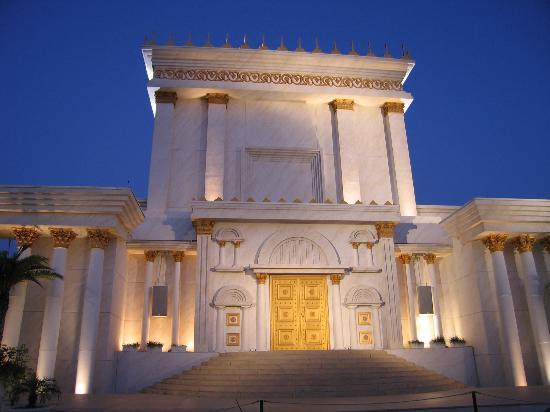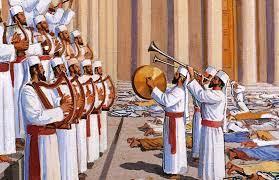The Portion for the Levites
18: 21-23
The Portion for the Levites DIG: How much was the total tithe in ancient Isra’el? How were the Levites cared for? Why the firstfruits of their harvests? What does the Bible say about our tithing today? What was the most famous function of the Levites? Why didn’t the Levites have any inheritance of land?
REFLECT: How can, and should, we care for our spiritual leaders, both paid and unpaid? What do you think is the believer’s responsibility in the area of giving? Are the needs of your spiritual leaders being cared for? What sacrifices do you need to make for your spiritual leaders so that their needs are met?
This was their inheritance, as the inheritance of ADONAI, in the present and future;
when God would bring Isra’el into the Land of their inheritance.

The tithe of the firstfruits (18:21a): To the descendants of Levi I have given the entire tenth of the produce, the firstfruits, collected in Isra’el as their portion as part of their tithe (18:21a). This is a continuation of the address given to Aaron, implying that Aaron, as head of the tribe of Levi, was responsible for seeing to it that the Levites received their tithes. This tithe was a compulsory, permanent grant to the Levites. It was due on every crop in the Promised Land as an annual wage (Lev 27:30-31).361
The Israelites were obligated to pay three different tithes: first, a tithe of their firstfruits to the Levites, seen here; second, a tithe that was set aside from the farmer’s crops and livestock, which was taken to Jerusalem and eaten by the owner, his family and friends during the week-long festival of Sukkot (see the commentary on Leviticus Eg – Hag Sukkot) and was, as it were, a tithe to be eaten before ADONAI; and third, there was another ten percent to be given every third year to provide for the outsider, the orphan and the widow (see the commentary on Deuteronomy Cx – Do Not Neglect the Levite).The sum total of the religious obligations levied upon the Israelites in the Dispensation of the Torah was, to say the least, nothing short of enormous (see Exodus Da – The Dispensation of the Torah).362 But that is not the standard for us today in the Dispensation of Grace (see the commentary on The Life of Christ Do – When You Give to the Needy, Do Not Do It to be Honored by Others: To guide us, the Bible teaches seven principles of scriptural giving).
The duty of guarding the Tabernacle (18:21b-22): The tithe was their inheritance in payment for the service they rendered in the Tabernacle. The tithes that were transferred to the Levites here were clearly not simply a gift, but was looked upon as a wage given in exchange for their ministry in the Tabernacle.363 From now on, the people of Isra’el are not to approach the Tabernacle, so that they will not bear the consequences of their sin and die. During the wilderness wanderings, the three clans of Levites and the Aaronic priests would camp in the immediate vicinity of the four sides of the Tabernacle, between it and the three other tribes who camped on the perimeter (see Am – The Camp of the Twelve Tribes of Isra’el). They acted first as a barrier between the holy Tabernacle and the community at large, ensuring its sanctity by guarding against advance by any unauthorized person, including any unclean of their own Levite clans.364
Only the Levites are to perform the service in the Tabernacle, and they will be responsible for whatever they do wrong. Therefore, if, through their negligence, an unauthorized person approached the Sanctuary to perform holy functions (see Cn – Korah’s Rebellion), the Levites would bear the sin committed by that person. Together, the priests and the Levites guarded the Israelite camp from encroaching upon the holiness of God’s Presence in their midst. In this way, they protected the people from the wrath of Ha’Shem and the death that it brought (18:1-5).365
Other Levitical duties: The priests functioned primarily inside the Sanctuary with the holy things and the bronze altar; while the Levites assisted the priests by guarding the outside of the Tabernacle from any encroachment by any Israelite in the camp, carrying the holy things on the march (for example At – The Clan of Kohath), teaching the people the Torah, being gatekeepers and Temple guards, also serving as judges in the cities of refuge (see the commentary on Deuteronomy Dm – Six Cities of Refuge). ADONAI knew that the priests would need reliable helpers who could assist them in their duties. All priests were to be Levites, but not all Levites were priests.
Levitical musicians and singers: The most famous function of the Levites was that of Tabernacle/Temple musicians and singers. They ministered with song before the Tabernacle, until Solomon had built the house of ADONAI in Jerusalem (First Chronicles 6:32), at which time they were divided into regular rotations, singing daily in the Temple accompanying themselves with harp, lyre, trumpet, cymbal and drum. Their song book was the book of Psalms. Their praiseful music accompanied the various daily offerings.

The Temple choir sang on the fifteen semicircular steps led from the Court of the Women, through the Nicanor Gate and into the Court of Isra’el. During the great feasts these magnificent steps served as a podium for the choir and the orchestra. From the Talmud Tractate tamid we know exactly which Psalm would have been sung on which day of the week in connection with the daily burnt offering in the Temple. It is astonishing how closely each of the Psalms coincides with the singing of these daily readings. In addition, it is amazing how the daily psalms coincided exactly with the daily events during the Holy Week (see the commentary on The Life of Christ It – Jesus’ Triumphal Entry into Jerusalem as the Passover Lamb).366

King David appointed three Levitical families at the head of the Temple choirs: the sons of Asaph, Heman and Jeduthun. These were the key Levites that were given the responsibility of conducting the Tabernacle worship services when David brought the ark of the covenant to Jerusalem (First Chronicles 16:37-42). All these were under the direction of their father to sing in the house of ADONAI, with cymbals, harps and lyres, for the service of the house of God. Asaph, Heman, and Jeduthun were under the direction of the king (First Chronicles 25:6). Psalms 50 and 73-83 are attributed to Asaph. Psalms 39, 62 and 77 mention Jeduthun, while Psalm 88 specifically references Heman.
It is interesting to note that Heman and his sons were descendants of Korah (First Chronicles 6:32-38). Psalms 42-49, 84-85, 87-88 are all attributed to the sons of Korah. Apparently, Korah’s infamy did not prevent his descendants from rising to a place of great prominence among the house of Levi. The psalms are filled with references to the Levitical singers. Musical notations indicating instrumentation, melody and genre often head the Psalms. Frequently, the Psalms themselves make reference to the song service. Rejoice in ADONAI, you righteous! Praise is well-suited to the upright. Give thanks to ADONAI with the lyre, sing praises to him with a ten-stringed harp (Psalm 33:1-2). For the director of music. According to gittith (probably a musical term) Of Asaph. Sing for joy to God our strength; shout aloud to the God of Jacob! Begin the music, strike the timbrel, play the melodious harp and lyre (Psalm 81:1-2).
A glimpse into the life of Levitical singers: The Scriptures give us several glimpses into the world of the Levitical singers. In one instance ADONAI prophecies through the mouth of a Levitical singer (Second Chronicles 20:14). Jehoshaphat sent the Levitical singers at the head of the army singing, “Give thanks to ADONAI, for His lovingkindness is everlasting” (Second Chronicles 20:21). In Psalm 42, a Levitical singer reminisces about the glad days when he used to go along with the worshippers and lead them in procession to the house of God, with the voice of joy and thanksgiving, a multitude observing the festival (Psalm 42:4). In Psalm 137, a Levitical singer, then a captive in Babylon, laments that his Babylonian captors wanted him to provide some entertainment: When those who had taken us captive asked us to sing them a song; our tormentors demanded joy from us saying: Sing us one of the songs from Tziyon!” How can we sing a song about ADONAI here on foreign soil? The psalmist would rather forget how to play the harp: may my right-hand wither away, and lose his voice: may my tongue stick to the roof of my mouth, than to play the holy music of the Temple for the Babylonians.367
No inheritance of the Land (18:23-24): This is to be a permanent regulation through all your generations during the Dispensation of Torah. And like the priests, they were to have no inheritance among the people of Isra’el (18:23). Instead, they would be scattered in 48 cities among the other tribes. Because I have given to the Levites as their inheritance the tenths of the produce which the people of Isra’el set aside as a gift for ADONAI. This is why I have said to them that they are to have no land inheritance among the people of Isra’el (18:24). The principle here is clear, and is often emphasized in the Scripture. Those who serve the Lord and His people should be supported from the material blessings God gives His people. For the worker deserves his wages (Luke 10:7; Matthew 10:10), Yeshua said, and Paul wrote: In the same way, the Lord has commanded that those who preach the Gospel should receive their living from the Gospel (First Cor 9:14). Paul further explained this principle in Galatians 6:6-10; Philippians 4:10-19; and First Timothy 5:17-18.
The Israelites didn’t always obey this mitzvah and bring their tithes to the LORD, and as a consequence, the ministry of the Tabernacle and the Temple suffered (Nehemiah 10:35-39, 12:44-47, 13:10-14; Malachi 1:6 to 2:9). If the priests and Levites didn’t have food for their families, then they had to leave the Tabernacle and go to work in the fields (Nehemiah 13:10). It’s tragic when God’s people don’t love the Lord and the Lord’s house enough to support it faithfully.368
Dear Heavenly Father, praise Your graciousness and kindness to allow me the privilege of serving You, the great Almighty Sovereign of the Universe. It is a privilege to honor You by giving back to You from what You have bestowed upon me. By Your Word You created (Colossians 1:16, Genesis 1) and You could just speak and continue creating whatever the priests You needed, but it was Your kindness to allow that the needs of the priests would be fulfilled by the people. You open a door of blessing for those who gave generously.
You love to bless! Your blessing of salvation is fantastic! You also bless by giving rewards to Your children. It is not the size of the gift that is so important to You, but You look at the heart that gives the gift and You look for the attitude of humbleness and love. For no one can lay any other foundation than what is already laid – which is Yeshua the Messiah. Now if anyone builds on the foundation with gold, silver, precious stones, wood, hay, straw, each one’s work will become clear. For the Day will show it, because it is to be revealed by fire; and the fire itself will test each one’s work – what sort it is. If anyone’s work built on the foundation survives, he will receive a reward (First Corinthians 3:11-14). It is a joy to bless You by giving tithes and offerings! Giving generously to You of our time, money, and talents is the wisest way to invest in future eternal joy! In Messiah Yeshua’s holy Name and power of His resurrection. Amen



Leave A Comment